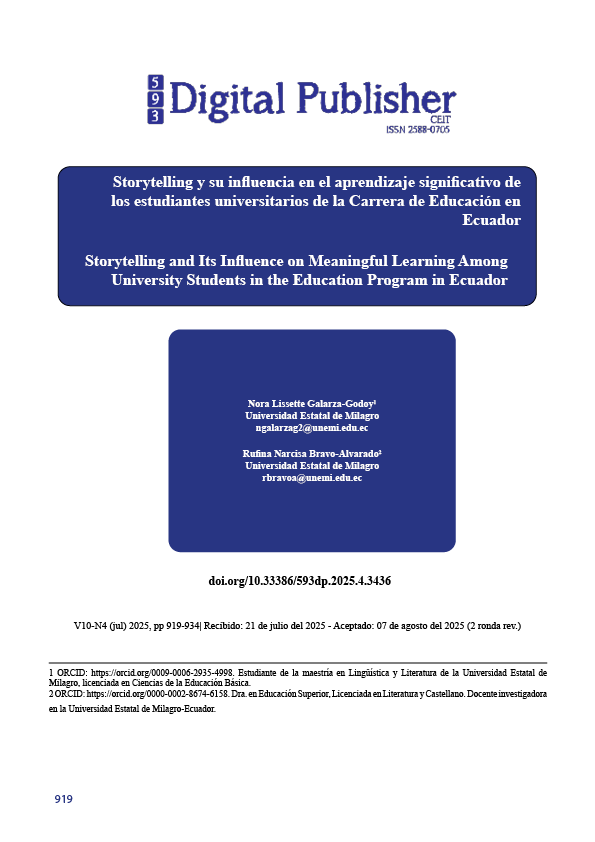Storytelling y su influencia en el aprendizaje significativo de los estudiantes universitarios de la Carrera de Educación en Ecuador
Contenido principal del artículo
Resumen
En el ámbito de la educación superior, el storytelling se ha posicionado como una estrategia pedagógica efectiva para fortalecer la comprensión significativa de los contenidos y fomentar la implicación emocional del estudiantado. Este estudio tuvo como objetivo analizar la influencia del storytelling en el aprendizaje significativo de los estudiantes de la Carrera de Educación Básica Semipresencial de la Universidad Central del Ecuador. La investigación adoptó un enfoque cuantitativo, de nivel descriptivo y diseño no experimental, con la aplicación de un cuestionario estructurado a una muestra intencional de 36 docentes. El instrumento fue validado mediante juicio de expertos y presentó altos niveles de fiabilidad de 0,98. Los datos se procesaron con SPSS versión 25, mediante análisis descriptivos, correlacionales y regresión lineal múltiple. Los hallazgos evidenciaron una valoración favorable hacia el uso del storytelling y su fuerte asociación con dimensiones del aprendizaje significativo como la retención cognitiva, la autonomía y la implicación emocional. Además, se identificó que el nivel académico del profesorado influye significativamente en la percepción del aprendizaje, mientras que otras variables no mostraron efectos relevantes. Las tres hipótesis fueron aceptadas, lo que respalda el impacto positivo del enfoque narrativo en la calidad del aprendizaje en contextos semipresenciales. Se concluye que el storytelling representa una herramienta didáctica eficaz en la formación docente. Se sugiere ampliar la investigación hacia otras poblaciones y aplicar diseños longitudinales para evaluar efectos sostenidos en el tiempo.
Descargas
Detalles del artículo

Esta obra está bajo una licencia internacional Creative Commons Atribución-NoComercial-CompartirIgual 4.0.
1. Derechos de autor
Las obras que se publican en 593 Digital Publisher CEIT están sujetas a los siguientes términos:
1.1. 593 Digital Publisher CEIT, conserva los derechos patrimoniales (copyright) de las obras publicadas, favorece y permite la reutilización de las mismas bajo la licencia Licencia Creative Commons 4.0 de Reconocimiento-NoComercial-CompartirIgual 4.0, por lo cual se pueden copiar, usar, difundir, transmitir y exponer públicamente, siempre que:
1.1.a. Se cite la autoría y fuente original de su publicación (revista, editorial, URL).
1.1.b. No se usen para fines comerciales u onerosos.
1.1.c. Se mencione la existencia y especificaciones de esta licencia de uso.
Citas
Aguilar-Gordón, F. del R. (2024). El conocimiento de estrategias de aprendizaje como alternativa para el fortalecimiento de competencias heutagógicas en estudiantes universitarios en modalidad virtual. Cátedra, 7(2), 19–40. https://doi.org/10.29166/catedra.v7i2.6182
Aura, I., Hassan, L., & Hamari, J. (2021). Teaching within a Story: Understanding storification of pedagogy. International Journal of Educational Research, 106, 101728. https://doi.org/10.1016/j.ijer.2020.101728
Barra, L. B., Fillola, A. M., & Ripoll, M. P. (2022). Identidad lectora de profesores noveles y mediación literaria digital: entrecruces entre trayectorias y competencias. Educação e Pesquisa, 48. https://doi.org/10.1590/s1678-4634202248233911
Bort Caballero, M. L., & Gil-Mediavilla, M. (2023). Intervención educativa con narrativas digitales en lengua y literatura española del grado universitario en educación primaria: una perspectiva en femenino. Formación Universitaria, 16(4), 43–52. https://doi.org/10.4067/s0718-50062023000400043
Cifuentes Jordán, K. E., Juna Olmedo, E. P., & Medina Chicaiza, P. (2024). Métricas de redes sociales en las facultades de la Universidad Técnica de Ambato. Dilemas Contemporáneos: Educación, Política y Valores. https://doi.org/10.46377/dilemas.v12i.4425
Cohn, N., & Magliano, J. P. (2020). Editors’ Introduction and Review: Visual Narrative Research: An Emerging Field in Cognitive Science. Topics in Cognitive Science, 12(1), 197–223. https://doi.org/10.1111/tops.12473
Craig, C. J. (1999). Parallel stories: a way of contextualizing teacher knowledge. Teaching and Teacher Education, 15(4), 397–411. https://doi.org/10.1016/S0742-051X(98)00062-6
da Silva, E. R., & Larentis, F. (2022). Storytelling from experience to reflection: ERSML cycle of organizational learning. The International Journal of Human Resource Management, 33(4), 686–709. https://doi.org/10.1080/09585192.2020.1737831
De la Iglesia Villasol, M. C. (2018). Aprendizaje Basado en un Proyecto Docente: Aprendizaje, creatividad, innovación y nuevos roles en la formación de profesorado en la era digital. Revista Complutense de Educación, 29(4), 1253–1278. https://doi.org/10.5209/RCED.55256
Fanidawarti Hamzah, Abdul Hakim Abdullah, & Widad Ma. (2024). Advancing Education through Technology Integration, Innovative Pedagogies and Emerging Trends: A Systematic Literature Review. Journal of Advanced Research in Applied Sciences and Engineering Technology, 41(1), 44–63. https://doi.org/10.37934/araset.41.1.4463
Ghanizadeh, A., Tabeie, M., & Pourtousi, Z. (2024). The role of university instructor’s narrative in students’ sustained attention, emotional involvement and cognitive learning. Journal of Applied Research in Higher Education, 16(1), 195–207. https://doi.org/10.1108/JARHE-09-2022-0278
Hermann Acosta, A. (2015). Narrativas digitales como didácticas y estrategias de aprendizaje en los procesos de asimilación y retención del conocimiento. Sophía, 1(19), 253. https://doi.org/10.17163/soph.n19.2015.12
Hermann Acosta, A. (2018). Innovación, tecnologías y educación: las narrativas digitales como estrategias didácticas. Killkana Social, 2(2), 31–38. https://doi.org/10.26871/killkana_social.v2i2.295
Isaacs, M.-A., Tondeur, J., & Vaesen, J. (2024). Digital storytelling in teacher education: Developing pre-service teachers’ critical thinking. Australasian Journal of Educational Technology. https://doi.org/10.14742/ajet.9258
Lampropoulos, G., & Kinshuk. (2024). Virtual reality and gamification in education: a systematic review. Educational Technology Research and Development, 72(3), 1691–1785. https://doi.org/10.1007/s11423-024-10351-3
Loprinzi, P. D., Edwards, M. K., & Frith, E. (2017). Potential avenues for exercise to activate episodic memory‐related pathways: a narrative review. European Journal of Neuroscience, 46(5), 2067–2077. https://doi.org/10.1111/ejn.13644
Manzano-León, A., Rodríguez-Ferrer, J. M., Aguilar-Parra, J. M., Fernández-Campoy, J. M., Trigueros, R., & Martínez-Martínez, A. M. (2022). Juega y aprende: influencia de la gamificación y aprendizaje basado en juego en los procesos lectores de alumnado de secundaria. Revista de Psicodidáctica, 27(1), 38–46. https://doi.org/10.1016/j.psicod.2021.07.001
Mattar, J. (2018). Constructivism and connectivism in education technology: Active, situated, authentic, experiential, and anchored learning. RIED. Revista Iberoamericana de Educación a Distancia, 21(2), 201. https://doi.org/10.5944/ried.21.2.20055
McInerney, P., & Green-Thompson, L. P. (2020). Theories of learning and teaching methods used in postgraduate education in the health sciences: a scoping review. JBI Evidence Synthesis, 18(1), 1–29. https://doi.org/10.11124/JBISRIR-D-18-00022
Mora Villamar, F. M., Yance Bajaña, J. E., Criollo Manzaba, G. T., Vega Monserrate, E. C., Abad Troya, L., & Masapanta Cuchipe, B. M. (2024). Integración de la Narrativas Digitales para Potenciar la Comprensión Lectora. Ciencia Latina Revista Científica Multidisciplinar, 8(6), 36–55. https://doi.org/10.37811/cl_rcm.v8i6.14493
Nelson, C. D. (2011). Narratives of Classroom Life: Changing Conceptions of Knowledge. TESOL Quarterly, 45(3), 463–485. https://doi.org/10.5054/tq.2011.256799
Novak, J. D. (2015). Ausubelian Theory of Learning. In Encyclopedia of Science Education (pp. 104–111). Springer Netherlands. https://doi.org/10.1007/978-94-007-2150-0_91
Pazos-Yerovi, E. I., & Aguilar-Gordón, F. del R. (2024). El Aprendizaje Basado en Problemas como estrategia metodológica para el desarrollo del Pensamiento Crítico. Revista de Estudios y Experiencias En Educación, 23(53), 313–340. https://doi.org/10.21703/rexe.v23i53.2658
Peñaloza Camacho, K. I., Reinado, M. M., Quizhpe Loor, M. M., Cumbicos Chuquimarca, R. E., & Maisanchi Zúñiga, S. (2025). Innovación en la enseñanza de la literatura mediante narrativa y gamificación como estrategias activas para motivar la lectura en nivel medio. LATAM Revista Latinoamericana de Ciencias Sociales y Humanidades, 6(3). https://doi.org/10.56712/latam.v6i3.3965
Rees Lewis, D. G., Gerber, E. M., Carlson, S. E., & Easterday, M. W. (2019). Opportunities for educational innovations in authentic project-based learning: understanding instructor perceived challenges to design for adoption. Educational Technology Research and Development, 67(4), 953–982. https://doi.org/10.1007/s11423-019-09673-4
Rowston, K., Bower, M., & Woodcock, S. (2020). The lived experiences of career-change pre-service teachers and the promise of meaningful technology pedagogy beliefs and practice. Education and Information Technologies, 25(2), 681–705. https://doi.org/10.1007/s10639-019-10064-8
Ruíz Murillo, J. R., Chiriboga Cisneros, F., Ortiz Zambrano, R., & Mora, F. M. (2025). El rol del storytelling en la conservación del patrimonio cultural: el caso de Santa Lucía, Guayas. Turismo y Patrimonio, 24, 121–144. https://www.revistaturismoypatrimonio.com/index.php/typ/article/view/turpatrim.2025.n24.07
Sáez-López, J.-M., Román-González, M., & Vázquez-Cano, E. (2016). Visual programming languages integrated across the curriculum in elementary school: A two year case study using “Scratch” in five schools. Computers & Education, 97, 129–141. https://doi.org/10.1016/j.compedu.2016.03.003
Sailors, M., & Alvermann, D. E. (2018). Theoretical Models and Processes of Literacy (D. E. Alvermann, N. J. Unrau, M. Sailors, & R. B. Ruddell, Eds.). Routledge. https://doi.org/10.4324/9781315110592
Sánchez-Martí, A., Sabariego Puig, M., Ruiz-Bueno, A., & Anglés Regós, R. (2018). Implementation and assessment of an experiment in reflective thinking to enrich higher education students’ learning through mediated narratives. Thinking Skills and Creativity, 29, 12–22. https://doi.org/10.1016/j.tsc.2018.05.008
Segura Torres, K. T., & Romero Gutierrez, J. M. (2024). Fomento de la Comprensión Lectora y la Expresión Creativa en Niños a través de la Inteligencia Visual. Ciencia Latina Revista Científica Multidisciplinar, 8(2), 4133–4152. https://doi.org/10.37811/cl_rcm.v8i2.10826
Sexton, S. S. (2025). Meaningful Learning—David P. Ausubel. In Science Education in Theory and Practice (pp. 157–171). https://doi.org/10.1007/978-3-031-81351-1_10
Tsevreni, I. (2011). Towards an environmental education without scientific knowledge: an attempt to create an action model based on children’s experiences, emotions and perceptions about their environment. Environmental Education Research, 17(1), 53–67. https://doi.org/10.1080/13504621003637029
Vieira, F. (2020). Pedagogy of Experience in Teacher Education for Learner and Teacher Autonomy. Profile: Issues in Teachers´ Professional Development, 22(1), 143–158. https://doi.org/10.15446/profile.v22n1.78079
Villarreal Espinosa, V. M. (2024). Estrategias pedagógicas para la educación emocional mediante cuentos digitales. Alpha International Journal, 2(1), 4–15. https://doi.org/10.63380/aij.v2n1.2024.26
Vitalaki, E., Kourkoutas, E., & Hart, A. (2018). Building inclusion and resilience in students with and without SEN through the implementation of narrative speech, role play and creative writing in the mainstream classroom of primary education. International Journal of Inclusive Education, 22(12), 1306–1319. https://doi.org/10.1080/13603116.2018.1427150
Zaitseva, E. V., Goncharova, N. V., & Daineko, L. V. (2024). Storytelling in Higher Education: A Literature Review. In Scenarios, Fictions, and Imagined Possibilities in Science, Engineering, and Education (pp. 3–31). https://doi.org/10.1007/978-3-031-76800-2_1
Zambrano Verdesoto, G. J. (2021). Metodologías activas generadoras de un aprendizaje significativo en la educación superior. Editorial Científica 3Ciencias. https://doi.org/10.17993/DideInnEdu.2021.49
Zapata Parra, Z. P., Jumbo Masache, L. E., Ponce Tituaña, L. G., & Andrango Ruiz, B. B. (2024). Recursos Lúdicos que Estimulan una Narrativa en la Enseñanza de la Historia. Revista Social Fronteriza, 4(4), e44383. https://doi.org/10.59814/resofro.2024.4(4)383



